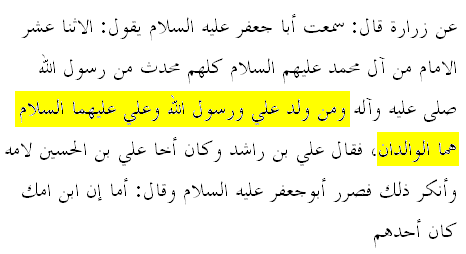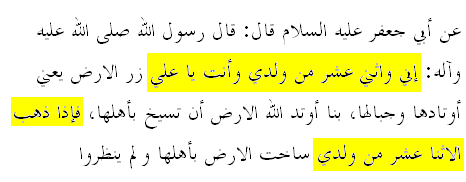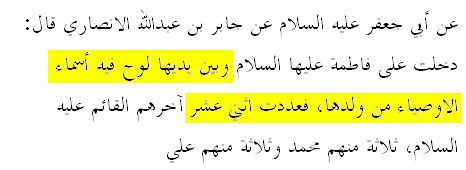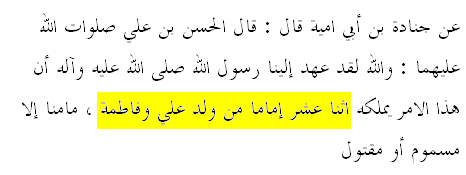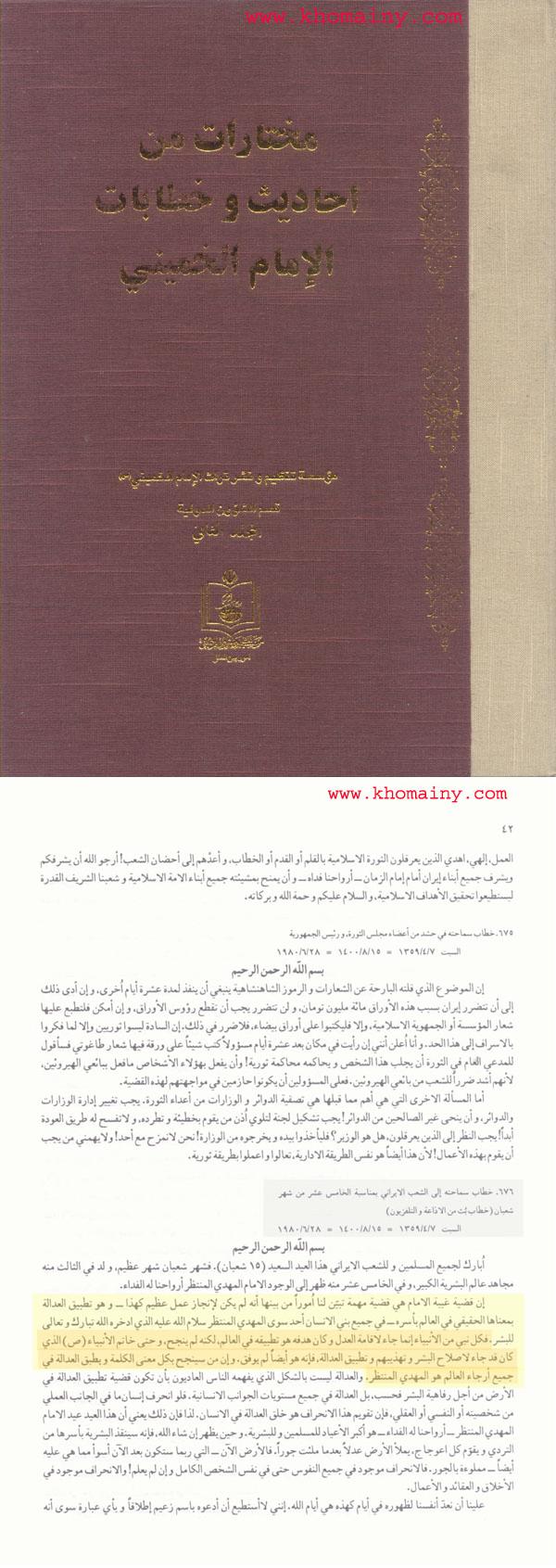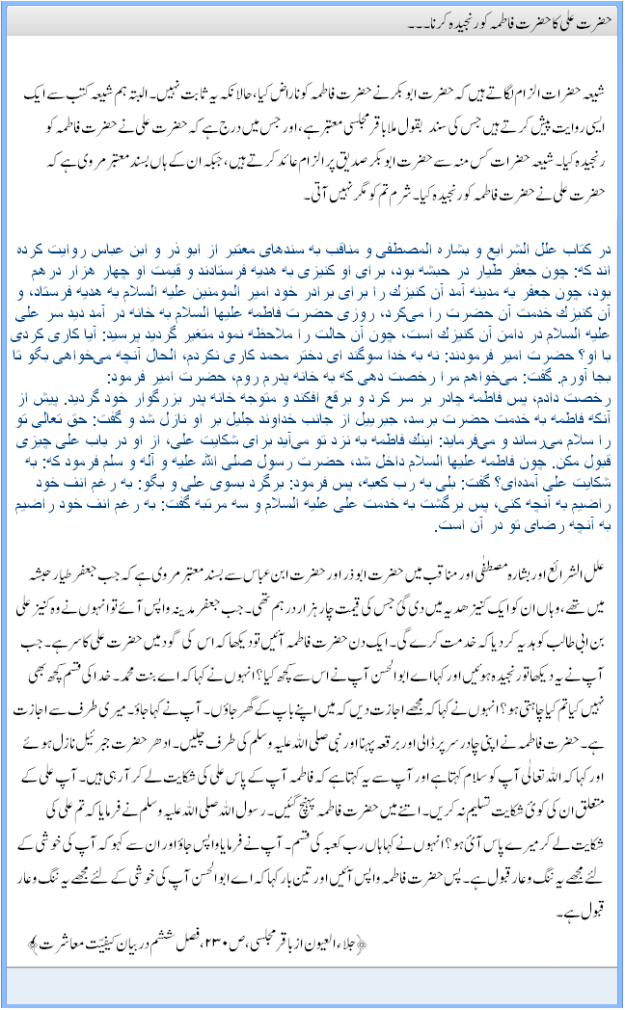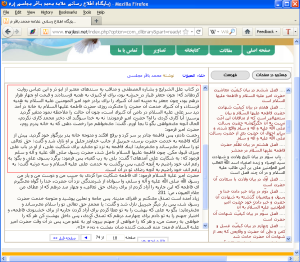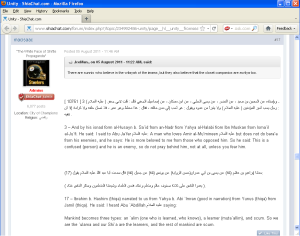In the Holy Quran, we read explicit verses in the virtues of the companions of the Prophet (S)
محمد رسول الله والذين معه اشداء على الكفار رحماء بينهم تراهم ركعا سجدا يبتغون فضلا من الله ورضوانا سيماهم في وجوههم من اثر السجود ذلك مثلهم في التوراة ومثلهم في الانجيل كزرع اخرج شطأه فازره فاستغلظ فاستوى على سوقه يعجب الزراع ليغيظ بهم الكفار وعد الله الذين امنوا وعملوا الصالحات منهم مغفرة واجرا عظيما
[048:029] Muhammad, (SAW), is the messenger of Allah. He and his followers are tough on the unbelievers; but they are kind to each other. You see them bowing, and falling down prostrate (before Allah) seeking His favors and His acceptance. The distinctive effect of prostrating (before their Creator) is apparent on their faces. Such is their description in the Torah. About them, the Gospel quotes the parable, “It is as if the seed is sown in the field. In time it sprouts and sends up a tiny green shoot. Then, it becomes strong and stout, and stands on its stalk. It delights the sower and enrages the unbelievers.” Allah promises forgiveness and a tremendous reward to those of the believers who perform the righteous deeds.
The Shia commentary by Pooya Ali says regarding this verse
Books of history written by well-known Muslim scholars record that immediately after the departure of the Holy Prophet from this world, the companions of the Holy Prophet began to harass and persecute the Ahl ul Bayt. Refer to the issue of Fadak in the commentary of Bani Israil: 26; Naml :15, 16; Nahl: 90 and Maryam: 2 to 15. After depriving the daughter of the Holy Prophet from her lawful inheritance, they set her house on fire. A door fell on her and proved to be the cause of her death.
I say this is totally against the Quranic verse, where the characteristic of the companions of the Prophet (s) is given as “kind to each other”, while you are trying to give a completely opposite meaning because of the history books. Even we have proved from the history books that the companions of the Prophet (s) were kind to eachother.
Let us expend on the parable, which completely refutes the thinking that this verse relates to Ali and the ahlelbayt only.
About them, the Gospel quotes the parable, “It is as if the seed is sown in the field. In time it sprouts and sends up a tiny green shoot. Then, it becomes strong and stout, and stands on its stalk. It delights the sower and enrages the unbelievers.
This parable refers to the companions of the Prophet (s). Allah made them strong after being weak and multiplied them into large numbers after being small in numbers. Seeing the growth and expansion of Islam and Muslims, the unbelievers became furious and angry towards them, burning in fire of jealousy. This is what the parable means.
We read in the Holy Quran
لايستوي منكم من انفق من قبل الفتح وقاتل اولئك اعظم درجة من الذين انفقوا من بعد وقاتلوا وكلا وعد الله الحسني والله بما تعملون خبير
Not equal among you are those who spent (freely) and fought, before the Victory, (with those who did so later). Those are higher in rank than those who spent (freely) and fought afterwards. But to all has God promised a goodly (reward). And God is well acquainted with all that ye do.
Surely the address is towards the companions of the Prophet (s). It is clearly mentioned that those who embraced Islam before the conquest of Mecca are superior to those who embraced Islam afterwards, effectively giving such companions of the Prophet (s) a higher rank than the nine imams of Shiites. But what is important is the promise of goodly reward for all the companions from God, whether they embraced Islam before the conquest of Mecca, or afterwards. The nine Imams of the Shiites are clearly not included in this verse of great virtue for the companions of the Prophet (s).
Than we read in Surah Fatah
لقد رضي الله عن المؤمنين اذ يبايعونك تحت الشجرة فعلم مافي قلوبهم فانزل السكينة عليهم واثابهم فتحا قريبا
[048:018] God’s Good Pleasure was on the Believers when they swore Fealty to thee under the Tree: He knew what was in their hearts, and He sent down Tranquillity to them; and He rewarded them with a speedy Victory;
Think about ‘He knew what was in their hearts’, it is very clear from this verse that they had good intentions and that is why God’s Good pleasure was on the companions who swore allegiance under the tree.
Again we read in the Holy Quran
للفقراء المهاجرين الذين اخرجوا من ديارهم واموالهم يبتغون فضلا من الله ورضوانا وينصرون الله ورسوله اولئك هم الصادقون
[059:008] (Some part is due) to the indigent Muhajirs, those who were expelled from their homes and their property, while seeking Grace from God and (His) Good Pleasure, and aiding God and His Apostle: such are indeed the sincere ones:-
Abu Bakr (ra) , Umar (ra), Uthman (ra) are definitely the ones who come under this verse. For they were expelled from their homes and property, and they were the ones who aided the Prophet in the way of Allah, they not only aided the Prophet (s) but they aided Ali (ra) in his marriage also. Read http://shiacult.word…ali-and-fatima/
We read in Surah Hajj
الذين اخرجوا من ديارهم بغير حق الا ان يقولوا ربنا الله ولولادفع الله الناس بعضهم ببعض لهدمت صوامع وبيع وصلوات ومساجد يذكر فيها اسم الله كثيرا ولينصرن الله من ينصره ان الله لقوي عزيز
[022:040] (They are) those who have been expelled from their homes in defiance of right,- (for no cause) except that they say, “our Lord is God”. Did not God check one set of people by means of another, there would surely have been pulled down monasteries, churches, synagogues, and mosques, in which the name of God is commemorated in abundant measure. God will certainly aid those who aid his (cause);- for verily God is full of Strength, Exalted in Might, (able to enforce His Will).
From this verse of Quran, we come to know that the only reason for which Abu Bakr, Umar and Uthman were expelled from their homes in Mecca were that they said “Our Lord is Allah”.
In the next verse, we read
الذين ان مكناهم في الارض اقاموا الصلاة واتوا الزكاة وامروا بالمعروف ونهوا عن المنكر ولله عاقبة الامور
[022:041] (They are) those who, if We establish them in the land, establish regular prayer and give regular charity, enjoin the right and forbid wrong: with God rests the end (and decision) of (all) affairs.
Establishing them in the land means giving them power. So from Quran we learn that if Allah give Abu Bakr, Umar and Uthman some power, they will enjoin the right and forbid wrong, while Shiites say that they enjoined the wrong and forbid the right. Of course, this is totally against Quran.
A Shia may say, why are you saying Abu Bakr, Umar and Uthman only? This verse is about all the migrants. I say, so I don’t disagree with it, if we say all the migrants, it still doesn’t exclude Abu Bakr, Umar and Uthman.
We read in the Holy Quran
فاستجاب لهم ربهم اني لااضيع عمل عامل منكم من ذكر او انثى بعضكم من بعض فالذين هاجروا واخرجوا من ديارهم واوذوا في سبيلي وقاتلوا وقتلوا لاكفرن عنهم سيئاتهم ولادخلنهم جنات تجري من تحتها الانهار ثوابا من عند الله والله عنده حسن الثواب
[003:195] And their Lord hath accepted of them, and answered them: “Never will I suffer to be lost the work of any of you, be he male or female: Ye are members, one of another: Those who have left their homes, or been driven out therefrom, or suffered harm in My Cause, or fought or been slain,- verily, I will blot out from them their iniquities, and admit them into Gardens with rivers flowing beneath;- A reward from the presence of God, and from His presence is the best of rewards.”
From this verse of the Holy Quran , we come to know that the companions of the Prophet (s) may have some bad deeds, but Allah promised them that their bad deeds, their inequities will be blotted out, and they will be admitted into Heaven. So we shouldn’t find errors in them, Allah has promised to forgive them.
And we read in the Holy Quran
ثم ان ربك للذين هاجروا من بعد مافتنوا ثم جاهدوا وصبروا ان ربك من بعدها لغفور رحيم
[016:110] But verily thy Lord,- to those who leave their homes after trials and persecutions,- and who thereafter strive and fight for the faith and patiently persevere,- Thy Lord, after all this is Oft-Forgiving, Most Merciful.
When Allah Almighty is merciful to them, how can someone reduce to the low level of finding errors in them? Allah is forgiveable but you don’t want to be forgiveable towards them? This is actually a huge error on your part.
We read in Surah Hashr
والذين تبوؤوا الدار والايمان من قبلهم يحبون من هاجر اليهم ولايجدون في صدورهم حاجة مما اوتوا ويؤثرون على انفسهم ولو كان بهم خصاصة ومن يوق شح نفسه فاولئك هم المفلحون
[059:009] But those who before them, had homes (in Medina) and had adopted the Faith,- show their affection to such as came to them for refuge, and entertain no desire in their hearts for things given to the (latter), but give them preference over themselves, even though poverty was their (own lot). And those saved from the covetousness of their own souls,- they are the ones that achieve prosperity.
In this verse, the same characteristic as mentioned in Quran 48:29 is repeated for the Ansar of the Madinah, that when the Muhajireen came to them, both of them were kind to eachother and they had no distaste for each other.
But the next verse shows the characteristic of the ummah , the third category after Muhajireen and Ansar. And what is their characteristic? Their main characteristic is that they don’t have any rancour against the companions of the Prophet (s).
والذين جاؤوا من بعدهم يقولون ربنا اغفر لنا ولاخواننا الذين سبقونا بالايمان ولاتجعل في قلوبنا غلا للذين امنوا ربنا انك رؤوف رحيم
[059:010] And those who came after them say: “Our Lord! Forgive us, and our brethren who came before us into the Faith, and leave not, in our hearts, rancour (or sense of injury) against those who have believed. Our Lord! Thou art indeed Full of Kindness, Most Merciful.”
Again we read in Quran
لايستوي منكم من انفق من قبل الفتح وقاتل اولئك اعظم درجة من الذين انفقوا من بعد وقاتلوا وكلا وعد الله الحسني والله بما تعملون خبير
[057:010] … Not equal among you are those who spent (freely) and fought, before the Victory, (with those who did so later). Those are higher in rank than those who spent (freely) and fought afterwards. But to all has God promised a goodly (reward). And God is well acquainted with all that ye do.
Again, we are told that those who embraced Islam before the conquest of Mecca are superior to those who embraced Islam after the conquest of Mecca, clearly giving those who embraced Islam before the conquest of Mecca superiority over nine Imams of the Shiites.
Again we read in the Holy Quran
ياايها الذين امنوا توبوا الى الله توبة نصوحا عسى ربكم ان يكفر عنكم سيئاتكم ويدخلكم جنات تجري من تحتها الانهار يوم لايخزي الله النبي والذين امنوا معه نورهم يسعى بين ايديهم وبايمانهم
[066:008] O ye who believe! Turn to God with sincere repentance: In the hope that your Lord will remove from you your ills and admit you to Gardens beneath which Rivers flow,- the Day that God will not permit to be humiliated the Prophet and those who believe with him. Their Light will run forward before them and by their right hands
We again read in the Holy Quran
اذ جعل الذين كفروا في قلوبهم الحمية حمية الجاهلية فانزل الله سكينته على رسوله وعلى المؤمنين والزمهم كلمة التقوى وكانوا احق بها واهلها وكان الله بكل شئ عليما
[048:026] While the Unbelievers got up in their hearts heat and cant – the heat and cant of ignorance,- God sent down His Tranquillity to his Apostle and to the Believers, and made them stick close to the command of self-restraint; and well were they entitled to it and worthy of it. And God has full knowledge of all things.
So it was Allah Almighty who made the companions of the Prophet (s) stick to the command of taqwa, because they were worthy of it and entitled to it.
We read in the Holy Quran
لكن الرسول والذين امنوا معه جاهدوا باموالهم وانفسهم واولئك لهم الخيرات واولئك هم المفلحون
[009:088] But the Apostle, and those who believe with him, strive and fight with their wealth and their persons: for them are (all) good things: and it is they who will prosper.
But the Shiites say those who believed with him later fought for the wealth of others also, and tried to snatch fadak.
We read in the Holy Quran
من المؤمنين رجال صدقوا ماعاهدوا الله عليه فمنهم من قضى نحبه ومنهم من ينتظر ومابدلوا تبديلا
[033:023] Among the Believers are men who have been true to their covenant with God: of them some have completed their vow (to the extreme), and some (still) wait: but they have never changed (their determination) in the least:
We read in the Holy Quran
واعتصموا بحبل الله جميعا ولاتفرقوا واذكروا نعمة الله عليكم اذ كنتم اعداء فالف بين قلوبكم فاصبحتم بنعمته اخوانا وكنتم على شفا حفرة من النار فانقذكم منها كذلك يبين الله لكم اياته لعلكم تهتدون
[003:103] And hold fast, all together, by the rope which God (stretches out for you), and be not divided among yourselves; and remember with gratitude God’s favour on you; for ye were enemies and He joined your hearts in love, so that by His Grace, ye became brethren; and ye were on the brink of the pit of Fire, and He saved you from it. Thus doth God make His Signs clear to you: That ye may be guided.
So Allah joined the hearts of the companions in love, and by His grace, they became brothers, and Shiites say they had hatred for eachother? If any Shiite say that it refers to Ali and ahlelbayt, we ask, was their enemies of eachother in the beginning? If the answer is no, and surely the answer is no, than we come to know that it refers to the whole companions of the Prophet (s), now we ask, do you deny that Allah put love between them? And if you agree, than you must accept that when Allah put love between them, no one can put hatred amongst them.
Again we read in the Holy Quran
ومن يشاقق الرسول من بعد ماتبين له الهدى ويتبع غير سبيل المؤمنين نوله ماتولى ونصله جهنم وساءت مصيرا
[004:115] If anyone contends with the Apostle even after guidance has been plainly conveyed to him, and follows a path other than that becoming to men of Faith, We shall leave him in the path he has chosen, and land him in Hell,- what an evil refuge!
We read in the Holy Quran
واذا قيل لهم امنوا كما امن الناس قالوا انؤمن كما امن السفهاء الاانهم هم السفهاء ولكن لايعلمون
[002:013] When it is said to them: “Believe as the others believe:” They say: “Shall we believe as the fools believe?” Nay, of a surety they are the fools, but they do not know.
The Shiites of today are doing exactly the same thing. We tell them to believe as the companions of the Prophet (s) believed. They say, should we believe as those fools believe? What is the difference between them and the kuffar of Mecca?
..
